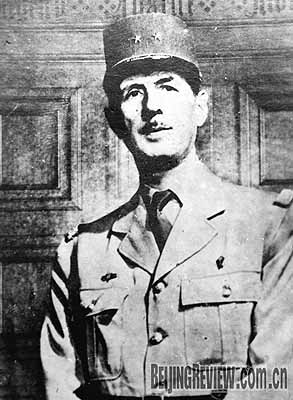|
 |
|
"China is not a nation or a nation-state, but fundamentally is a civilization, a very unique and very deep civilization" --Charles de Gaulle | People have repeatedly attributed to the French emperor Napoleon a statement that he probably never uttered and which has become an inept cliché "When China awakes, the world will shake." In a press conference on September 9, 1965, French President Charles de Gaulle shared a more nuanced and accurate view. "A fact of considerable significance is at work and is reshaping the world: China's very deep transformation puts her in a position to have a global leading role," he said. Indeed, the Chinese renaissance modifies the world's distribution of power in a gradual and peaceful process, which does not entail abrupt discontinuity or violent disruption.

On January 27, we celebrated the 45th anniversary of the establishment of diplomatic relations between France and the People's Republic of China (PRC). From a French perspective, the full recognition of the PRC was, above all, the decision of de Gaulle, one of France's greatest statesmen and a colossus of 20th century world politics.
In the geopolitical context of the 1960s, de Gaulle's judgment upon China was truly visionary and a perfect illustration of his ability to discern fundamental historical trends from perhaps more spectacular but less consequential events.
His exceptional acumen and strategic mind were not only at the origin of the special relationship between Paris and Beijing, but the spirit of his groundbreaking decision remains a reference to guide the future of Sino-French cooperation. It should certainly be seen as a source of inspiration to move past the Sino-French tension that marked 2008.
Only members of the Soviet camp immediately recognized the new Chinese regime in 1949. Although Sweden, Denmark and Switzerland established relations with China one year after Mao Zedong proclaimed the birth of the PRC, France was the first among the major Western countries to opt for diplomatic relations with Beijing at the ambassadorial level.
But when Lucien Paye, who had been minister of education, was appointed de Gaulle's first ambassador to China, the 15-year-old PRC was not only engaged in an ideological battle with the U.S.-led Western world, but it was also at odds with its two gigantic neighbors, India and the Soviet Union.
Due to the preeminent U.S. position in the post-war global configuration, President Richard M. Nixon's opening to Beijing in the 1970s was a geopolitical watershed of the highest importance. Commentators often expound on the American triangular diplomacy that exploited the rivalry between Beijing and Moscow, an ironic U.S. application of the Chinese strategy of "using the foreigners to subdue the foreigners" (yi yi zhi yi). U.S. National Security Advisor Henry Kissinger conceived and masterfully orchestrated this foreign policy shift, but he acknowledged the French General's foresight. "Interestingly enough, the leader who had first perceived the opportunities inherent in a Sino-Soviet split was the old man of European diplomacy, de Gaulle," Kissinger wrote in his 1994 book Diplomacy.
In the 1960s, isolated on the international stage, China also faced an internal crisis of considerable magnitude. In 1958, the Central Government wanted to accelerate the country's industrialization in a "Great Leap Forward." It was an enormous economic failure.
It was in this context that at the end of 1962, Mao Zedong composed a poem, "Winter Clouds," whose title encapsulates his perception of the imminent dangers looming over China. In it, he boldly referred to the hostile foreign forces with metaphors: "Only heroes can quell tigers and leopards/And wild bears never daunt the brave."
Under circumstances that might have deterred less confident characters, de Gaulle demonstrated his resolve. On January 31, 1964, in the Elysée Palace, he explained his decision to recognize Beijing in a press conference attended by hundreds of journalists.
His reasoning was solidly based on two pillars that are also two distinctive features of Gaullism: a long-term view and the effort to take into consideration, beyond transitory events or relatively short-lived phenomena, more permanent realities.
The French statesman began his conference by stating demographic and geographical facts. "The great Chinese people," he said, the largest population on earth, inhabited a vast country that "spans from Asia Minor and Europe's marchlands to the immense Pacific coast, and from the freezing Siberia to the tropical regions of India and Tonkin [Viet Nam]." Evidence and reason, de Gaulle explained, demanded that he work with the Chinese leadership. Long-lasting solutions to any serious problem in Asia or even in the world would depend on China's active and constructive participation.
|
